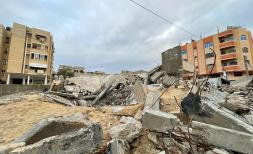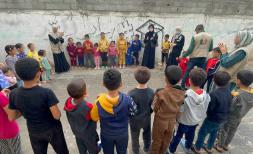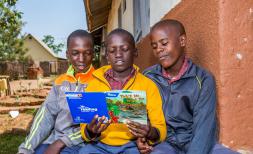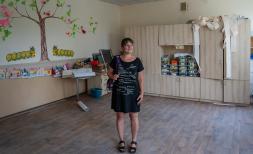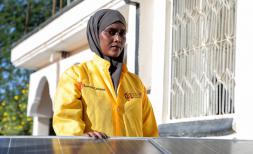Uncertain Futures for Children in West and Central Africa
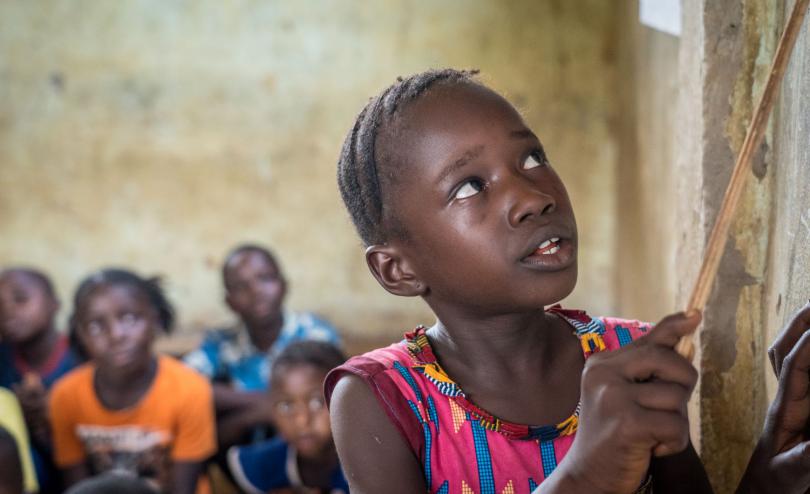
"I felt very bad about the fact that the school was closed during COVID-19 because I couldn't go to school anymore and we didn't know if we were going to resume classes. At the time I thought my future was uncertain. I was very scared when the school was closed because I'm in an exam class and I was afraid of this year being declared 'blank'."
This is what Rainata*, an 18 year old girl living in Bobo Dioulasso in Burkina Faso, told us. She is one of the 128 million children in West and Central Africa who was out of school as a measure to stop the spread of coronavirus. Although she was unable to access learning for months, she is one of the luckier children in the region.
Living in the second biggest city in Burkina Faso, and with important exams to take this year, she has recently returned to school. But for many other children, the uncertainty remains.
Millions of children are still at home, out of school, unable to access any form of alternative education. And for girls, the longer they are out of school, the higher the risk of being forced into a marriage while they are still children, as families turn to negative coping mechanisms to manage this period of economic hardship.
In West and Central Africa, even before the coronavirus pandemic there was an education crisis. The region has the lowest school enrolment rates in the world at primary level, with 78% for boys and 69% for girls. Shockingly, the enrolment rate drops significantly to 38% of boys and 31% of girls at secondary school level (2016 data). In countries like Niger, this translates to only 30% of the population over 15 being literate.
Now, according to our latest report, almost 10 million children worldwide may never return to school following COVID-19 lockdown - up to a third of them could be in West and Central Africa.
Nine countries from the region, out of 12 countries across the globe, are at 'extreme risk' of falling behind in their progress towards SDG4, Education For All, due to the pandemic.
Children living within the poorest and most marginalised communities are most at risk of never returning to school. Instead they face being forced into child marriage or child labour, and they are at increased risk of having unplanned pregnancies. We know from previous crises that the longer children are out of school, the greater the risk that they do not return to school and that they will lose out on vital learning.
In crisis, girls are particularly vulnerable to violence.
During discussions with young people in Sierra Leone on how COVID-19 has affected them, Josephine* said to us, "When I heard about it, I didn't feel good because I remember when we were stopped from going to school during Ebola and I became pregnant. My thinking now is that the same thing will happen to others as it happened to me".
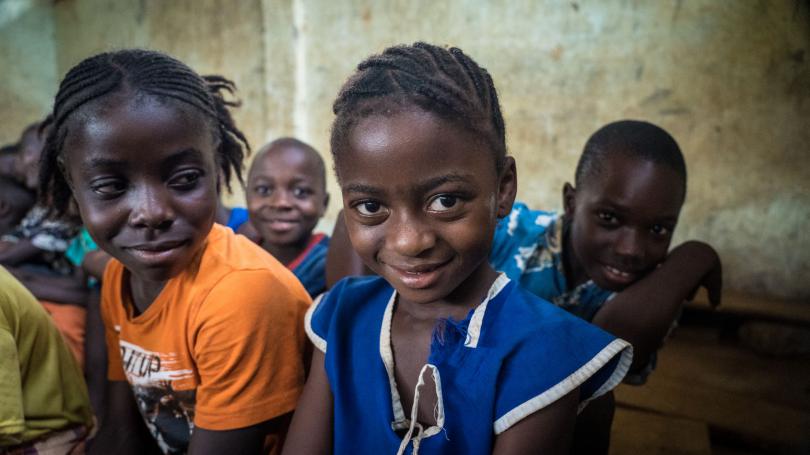
Crisis upon crisis in conflict zones in the region
The tragedy for millions of children is that the COVID-19 crisis has come on top of an existing crisis in the region, as countries across the Sahel were already hit by huge insecurities. In these conflicts, it has been schools and spaces of learning that have been directly targeted and attacked. Over the last weeks, we've started hearing cases of children being recruited by armed groups in the Sahel, a growing risk as children remain out of school.
When children began their school year in September 2019, we were already concerned by the astonishing 9,290 schools that were closed due to insecurity, affecting more than two million children and 44,000 teachers across the region.
But what is most heartbreaking is that when we've asked children living in conflict – like children in the Democratic Republic of Congo (DRC) affected by two decades of persistent conflict – about what really matters to them, they always talk about wanting to return to school: a place to learn and a safe place to be with their friends.
Adapting to ensure access to education
This is the first time in recent history that schools almost everywhere around the world have closed.
Each country took a different response to this crisis. In West and Central Africa, governments and the education communities came together to find innovative ways to establish TV and radio learning programmes across countries like Sierra Leone, Liberia, Nigeria, Senegal and Burkina Faso.
In Burkina Faso, the Ministry of Education created a dedicated radio learning programme which was broadcast across the whole country, while in Ghana, courses have been broadcast on Ghana Learning TV, which allowed close to 1 million high school students to continue their education.
In other countries like Mali, Senegal, Sierra Leone and Burkina Faso, schools have reopened only for classes with exams, while in Niger school has opened fully. Other countries like DRC are planning to start the new school year in August, to fill the learning gap created from the pandemic.
Despite this remarkable leadership, unfortunately, many children have not been able to benefit from the online platforms and virtual systems. According to UNESCO, nine out of 10 learners do not have access to household computers, and eight out of 10 lack internet access. Electricity remains a big challenge in many communities. How many children living in Gao, Djibo or Maradi – remote, plagued by conflict or with inaccessible services – have their own radio to get access to the daily programme?
So how do we build from these good but sometimes isolated examples of adaptation to develop long-term solutions to reach all children, especially the most vulnerable and marginalised, with education and learning?
We must avoid a lost decade for education
We're calling on governments to urgently integrate the most vulnerable children who do not have access to TV and digital platforms by establishing inclusive, long-term distance learning options for all children through low cost systems that consider local languages.
We need to increase efforts to ensure that girls and displaced children, who are most likely not to go back to school, are prioritised in governments' plans to return children to school. And these plans needs to continue beyond the COVID-19 crisis for children living in conflict areas.
With the support of their technical and financial partners, Ministries of Education need to develop comprehensive plans to ensure safe re-opening of schools, alongside long-term solutions to ensure that all children can always access education.
As the global pandemic threatens to cause additional gaps in investments in education in the Sub-Saharan region over the next 18 months, in West and Central Africa we need to increase funding for education, including converting debt liabilities into investment in children to bridge the potential $1.4 billion gap in education funding for Africa's most vulnerable children following the COVID-19 crisis.
Governments have shown us the direction over the last couple of months, but we now need to ensure that those efforts will be sustained and expanded at scale. Investing in an inclusive education system is the only way forward if we want to build a prosperous and peaceful region. If not, the futures of girls like Rainata* and Josephine* – and millions like them across West and Central Africa – could be under threat.
All over the world, Save the Children is rapidly adapting existing work whilst preparing for outbreaks of coronavirus in countries with limited capacity to respond. We've also launched the #SaveOurEducation campaign to tackle the global education emergency.
Read our new Save Our Education report.
*Names have been changed to protection identities.
